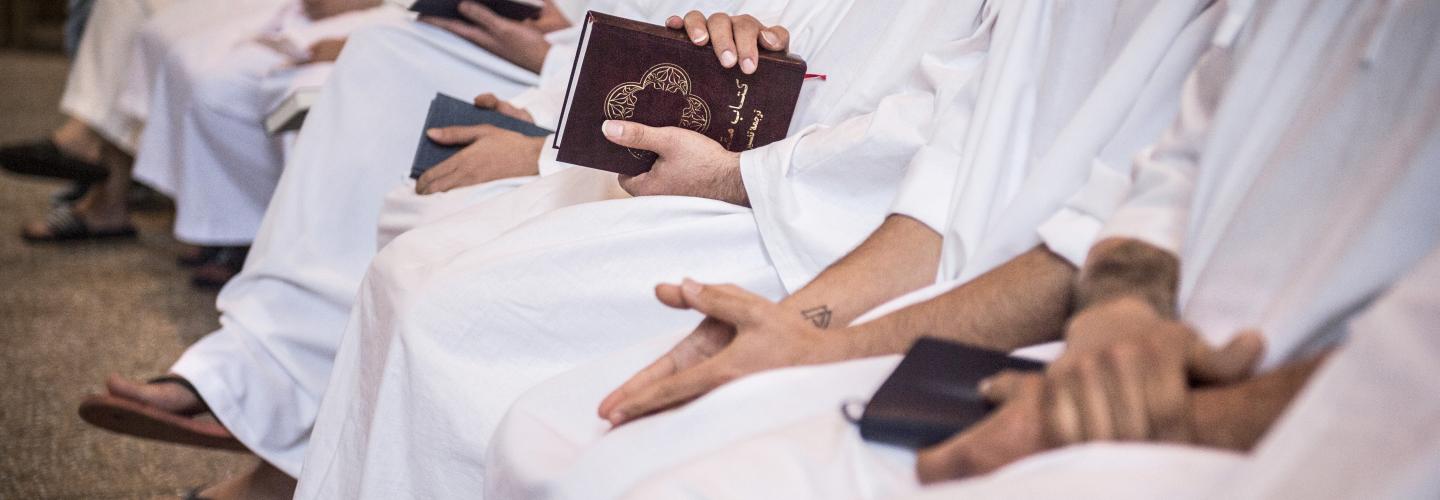In some countries your life is in danger if you convert to another religion (belief) or stop believing (apostate). You can also be in danger if you are not religious (an atheist). You may be sentenced to imprisonment or even death. The lives of these people is very hard in these countries. This can be a reason to get protection in the Netherlands.
The IND assesses whether a convert, apostate or atheist is eligible for a residence permit. We investigate whether the asylum seeker’s personal story is credible. This is difficult to do. We also ask what the asylum seeker is afraid of if they have to return to their country of origin. Eventually, the IND assesses whether this fear is founded and serious enough to grant the asylum seeker protection in the Netherlands. How does the IND make this decision?
Asylum seeker tells their story
It is up to the asylum seeker to convince the IND that they are a convert, apostate or atheist. The IND staff member asks the asylum seeker to tell their story. After this, they ask the ask the asylum seeker questions about their personal situation. These are, for instance, about why they converted or stopped believing. And how this happened exactly. The IND staff member also asks what the asylum seeker knows about their new or old religion. And what they are doing to become acquainted with their new religion and what the effect of this is. Or the IND staff member asks instead what it means not to take part in activities of the old religion anymore. What did the asylum seeker say about this in their country of origin? The IND staff member is specially trained to listen to the story with an open mind, ask the right questions and take cultural differences into consideration.
IND assesses credibility
It is then up to the IND to determine whether someone’s conversion, apostasy or atheism is credible. The asylum seeker’s statements are the basis for this. Sometimes we also use statements by others if these are available. For instance, a church may sometimes also give a statement. No person or situation is the same. Therefore, every asylum application is assessed individually, based on the applicable rules and work instructions. In these applications, the work instruction for conversion and apostasy (only in Dutch) is used particularly.
The IND assesses risk upon return
Does the IND think the asylum seeker’s story is credible? Then the IND assesses the risk for the asylum seeker if they had to return next. For this assessment, IND staff member considers answers the asylum seeker has given to questions such as, ‘How would you deal with your religion if you return?’ and, ‘What are you afraid of?’ If necessary, the IND staff member also uses country-specific information about the situation in the country of origin. Next, they estimate the risk of danger the asylum seeker runs if they have to return. And in any case, they discuss the application with a conversion coordinator. If both staff members deem it is too dangerous for the asylum seeker to return, they will be granted a residence permit.
New application sometimes follows a rejection
Sometimes, the IND considers the asylum seeker’s story not credible. Or the IND determines that the asylum seeker is not in danger if they return. The IND then rejects the asylum application. It happens that someone applies for asylum again. And then states that their new religion has become more profound, because of which they still need protection in the Netherlands. The IND then assesses this application together with the information from the earlier process.
Unknown how many asylum applications are about religion
Asylum seekers particularly give conversion, apostasy and atheism as a reason for asylum if they are from countries where this is forbidden. This concerns countries like, for example, Iran or Afghanistan. For reasons of privacy, the IND does not keep track of people’s reasons for asylum. Therefore, it is unknown how many asylum applications are about religion.
